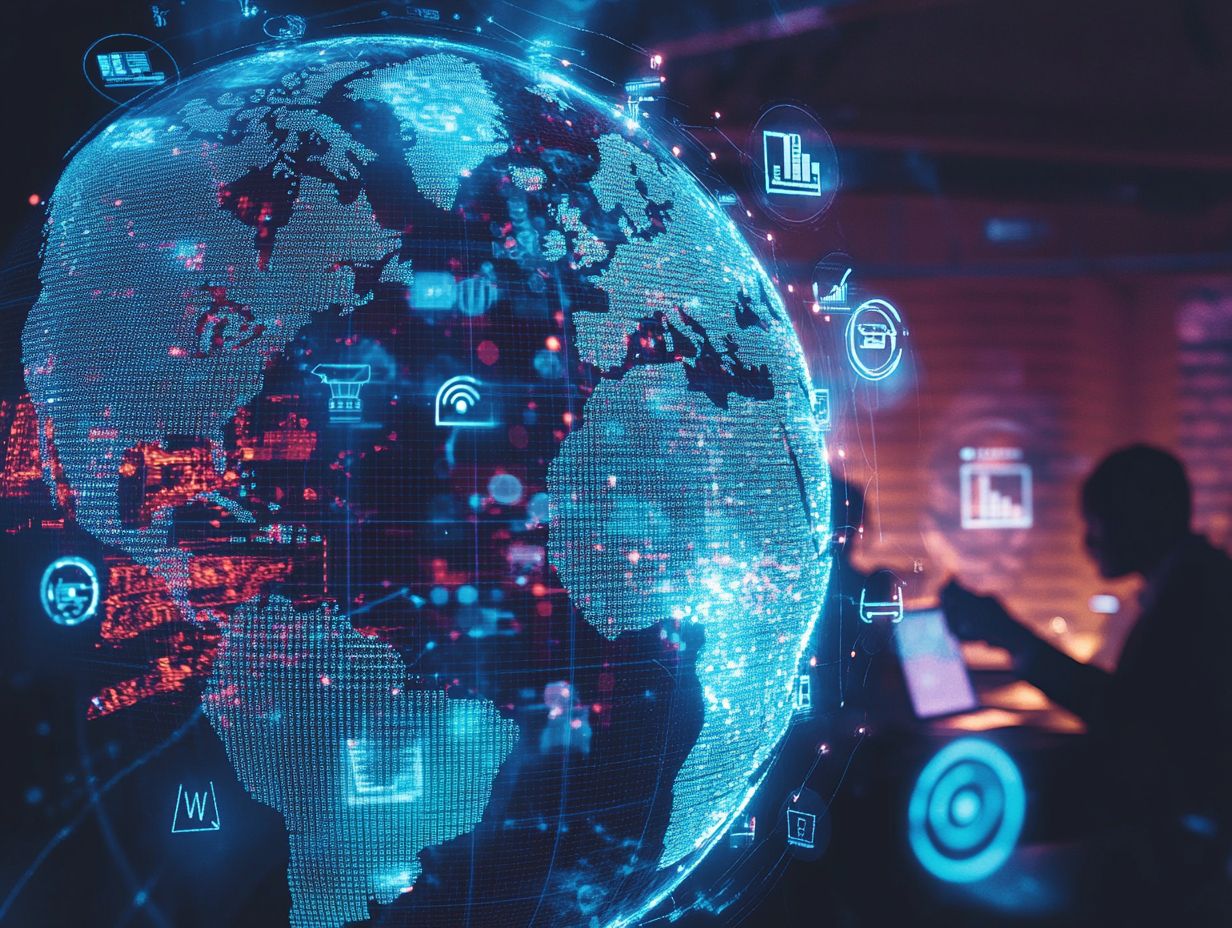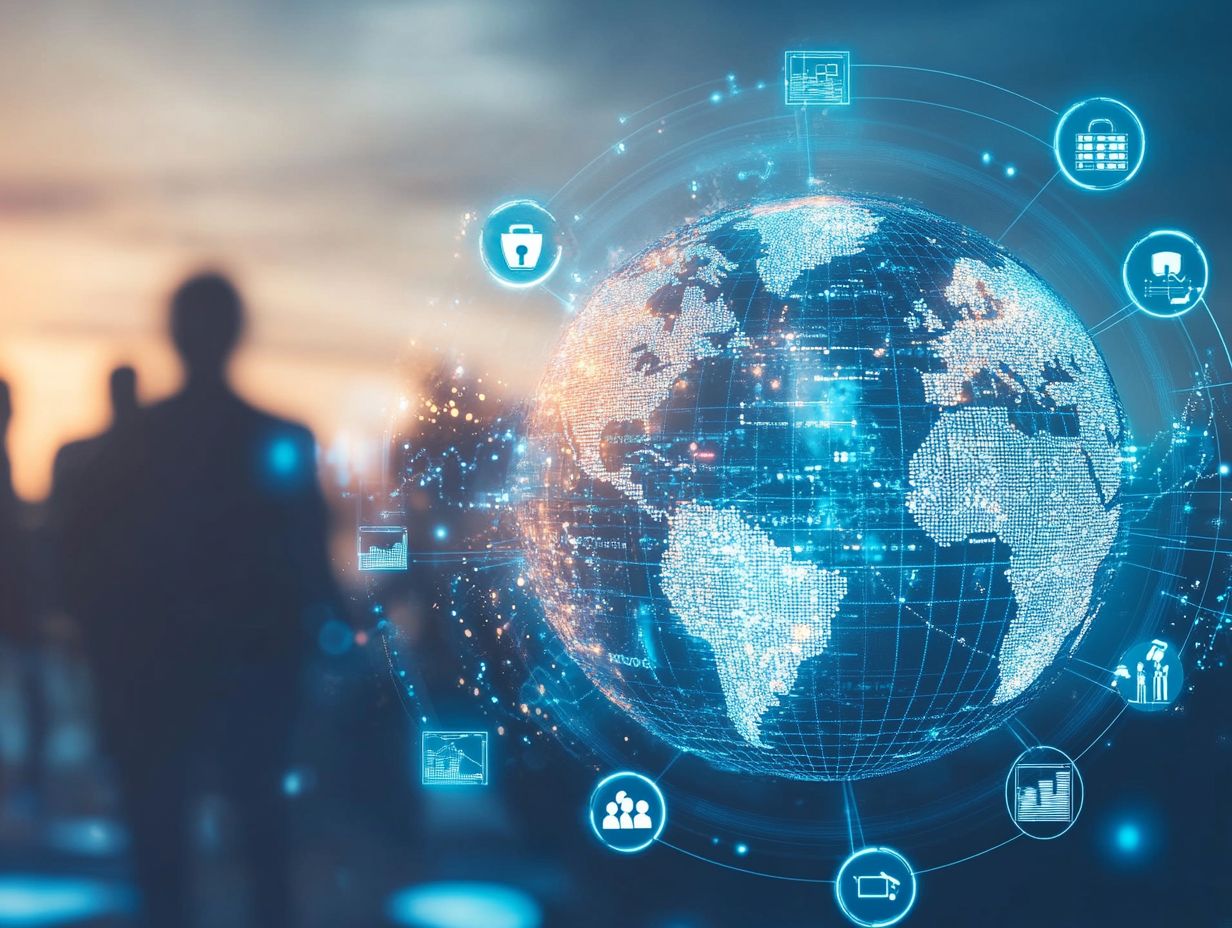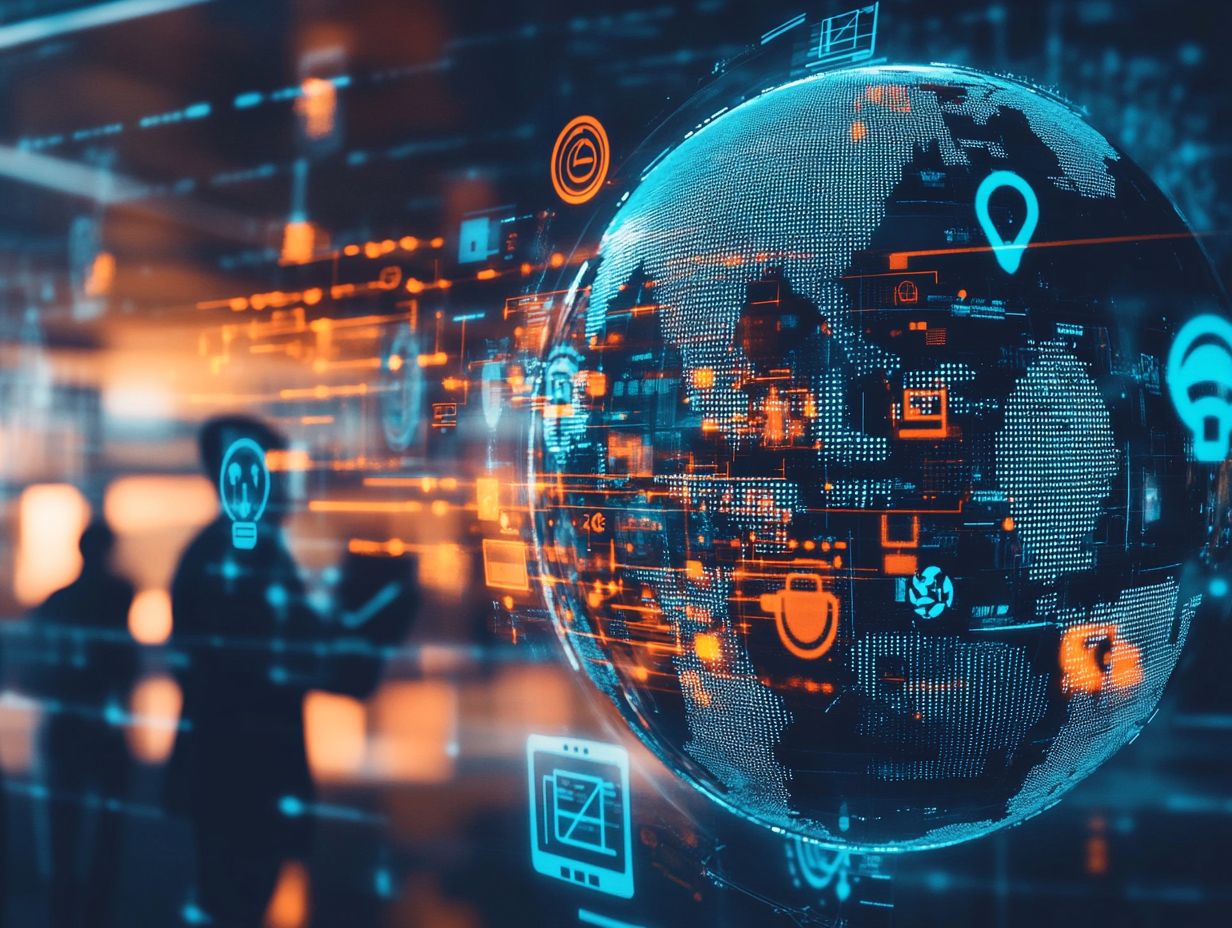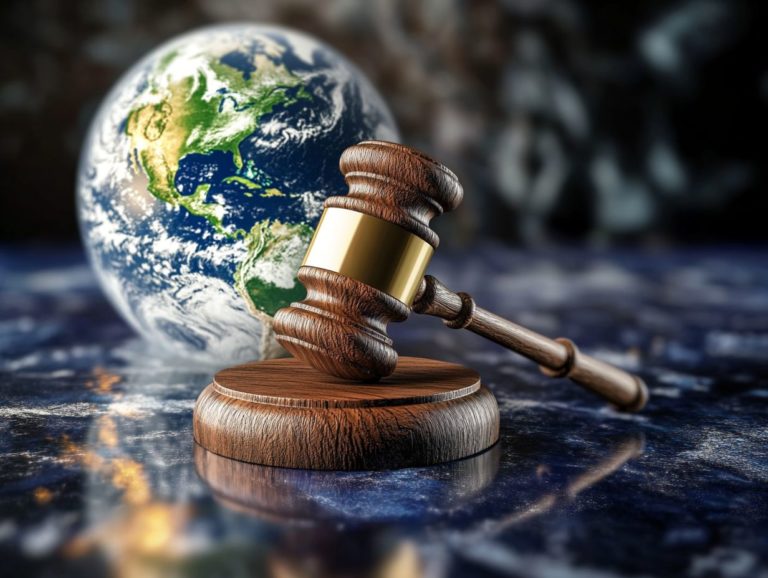IP Law and E-commerce: A Global Perspective
Understanding IP law is crucial for your success in the digital world! In today’s digital landscape, grasping the nuances of Intellectual Property (IP) law is essential for your online business. As e-commerce flourishes, the relationship between IP rights and online operations grows increasingly intricate.
This article delves into the significance of IP law and its impact on the e-commerce sphere. You ll discover the challenges online businesses encounter and uncover best practices for safeguarding intellectual property in this ever-evolving digital marketplace.
Don’t wait! Dive in now to protect your business and confidently navigate the world of IP law.
Contents
- Key Takeaways:
- Understanding Intellectual Property (IP) Law
- E-commerce and IP Law
- Global Perspectives on Intellectual Property Law and E-commerce
- Challenges and Solutions for E-commerce and IP Law
- Best Practices for E-commerce and IP Protection
- Frequently Asked Questions
- What is the importance of IP law in the context of e-commerce on a global scale?
- What types of intellectual property are protected under IP law in the context of e-commerce?
- How does IP law differ from country to country in terms of e-commerce?
- What are some common IP law issues that arise in the context of e-commerce on a global level?
- How can businesses protect their intellectual property in the global e-commerce market?
- What are the consequences of not complying with IP laws in the context of global e-commerce?
Key Takeaways:

- Intellectual property (IP) law is crucial for protecting the creative and innovative works of individuals and businesses.
- Understanding IP law is key to navigating the world of e-commerce.
- E-commerce has greatly impacted businesses worldwide.
- Stay informed about the constantly evolving laws and regulations surrounding IP in the online marketplace.
- When conducting e-commerce globally, compare the different IP laws of various countries.
Understanding Intellectual Property (IP) Law
Intellectual Property (IP) Law encompasses the legal rules crafted to protect the rights of creators and innovators across diverse industries. This ensures that their inventions, designs, and brands are effectively shielded from unauthorized use.
Such protection is essential for maintaining consumer trust and nurturing innovation. Especially in fast-paced sectors like e-commerce, businesses depend on strong IP protection to flourish within a highly competitive global trade landscape.
Definition and Importance
Intellectual property includes remarkable creations of the mind, such as inventions, literary and artistic works, designs, symbols, and names used in commerce. This framework serves as a vital instrument for innovation and economic growth, ensuring that you, as a creator, can reap the rewards of your inventions and ideas.
You can protect various forms of intellectual property, such as:
- Patents, which protect your inventions;
- Copyrights, tailored to safeguard your original works of authorship;
- Trademarks, designed to defend your brand identity;
- Trade secrets, which are business information that gives you an advantage.
By protecting these invaluable creations, you can enhance brand recognition and foster trust in the marketplace. A solid intellectual property framework is essential for promoting technology integration within the e-commerce sector, giving you the power to navigate the digital landscape with both confidence and creativity.
E-commerce and IP Law
Navigating the intersection of e-commerce and IP law is essential for you as an online retailer. You must adeptly address the complexities of intellectual property protection, which is outlined in the International IP Law: A Beginner’s Guide, to safeguard your unique offerings. This ensures you uphold your reputation in a digital marketplace teeming with counterfeit products and unauthorized transactions.
Impact on Online Businesses

Online businesses like yours rely heavily on effective IP governance to cultivate consumer trust and elevate brand value. By protecting your innovative products and ideas, you not only fend off competitors but also provide consumers with the reassurance that they are purchasing authentic goods.
This assurance is vital in a realm frequently plagued by digital piracy, which can erode both brand integrity and customer confidence. Navigating the intricate terrain of enforcing IP rights online comes with its own challenges. It s essential for you to implement proactive strategies, such as monitoring your digital assets and leveraging technology to track infringements.
Grasping the nuances of international IP laws is crucial for building a reputable online presence and ensuring sustainable growth.
Global Perspectives on Intellectual Property Law and E-commerce
Global perspectives on intellectual property (IP) law and e-commerce unveil a complex landscape. Companies like Alibaba Group, JD.com, and Xiaomi adeptly maneuver through diverse legal frameworks, often navigating IP law across borders and IP protections across various countries.
This strategic navigation is essential for enhancing their market share in the competitive realm of global trade.
Comparison of Different Countries’ Laws
Comparing IP laws across different countries reveals a rich tapestry of legal frameworks and compliance requirements. These significantly impact global trade and e-commerce operations. Understanding these nuances, especially the international IP law and the digital economy, is crucial for e-commerce businesses that aspire to thrive on the international stage.
Some jurisdictions prioritize patent protection for innovations, while others lean towards copyright laws. This results in varying levels of intellectual property protection. Insights from the World Intellectual Property Organization (WIPO) indicate that the United States and countries in the European Union enforce more stringent regulations compared to emerging markets.
This divergence poses challenges for businesses when crafting strategies for entering new markets. Compliance becomes a crucial factor influencing operational costs and risk management.
Challenges and Solutions for E-commerce and IP Law
Navigating the complexities of e-commerce presents significant challenges, particularly concerning IP law. Combatting counterfeit products is just the tip of the iceberg.
You also face international issues that complicate effective IP protection in an increasingly digital age, where cloud computing and online transactions are the norm.
Addressing International Issues

Addressing international issues in IP law is essential for online retailers looking to build a solid framework. This framework must tackle counterfeit products and safeguard innovations on a global scale.
Navigating the intricate landscape of cross-border infringements presents notable challenges. Different countries enforce IP laws with varying degrees of rigor and effectiveness, creating a confusing patchwork of protections that complicate efforts to secure intellectual property.
Enhancing IP governance requires collaboration with global entities like trade organizations and international governing bodies. By fostering these partnerships, businesses can tap into shared resources and expertise, developing more effective enforcement mechanisms.
This approach leads to a safer marketplace where innovation can flourish and consumers are protected from counterfeit products.
Best Practices for E-commerce and IP Protection
Implementing best practices for IP protection is crucial for e-commerce business owners. These practices help build consumer trust while effectively safeguarding intellectual property against infringement and counterfeit threats in the online marketplace.
Protecting Your Business and Intellectual Property
To protect your business and intellectual property, you must implement comprehensive strategies. These should encompass IP protection, legal compliance, and safeguarding trade secrets from unauthorized access or use.
This involves leveraging legal tools such as patents, trademarks, and copyrights, which form the cornerstone of robust IP governance.
Incorporating advanced technology solutions enables you to monitor potential infringements and unauthorized distributions easily.
Regular training sessions for employees on IP rights and best practices are equally vital. This creates an environment where everyone understands the importance of protecting intellectual assets.
By fostering a culture of awareness and vigilance, you significantly reduce risks. Take proactive steps to ensure that your innovations remain protected in a competitive landscape.
Frequently Asked Questions
Have questions? Stay tuned for answers coming soon!
What is the importance of IP law in the context of e-commerce on a global scale?

IP law is vital for protecting the rights of creators and owners in the digital marketplace. As e-commerce grows, understanding international IP law trends and developments helps prevent infringement and ensures fair competition worldwide.
What types of intellectual property are protected under IP law in the context of e-commerce?
IP law safeguards creative works like inventions, logos, and original content. This protection is essential for e-commerce businesses to secure their unique products and branding.
How does IP law differ from country to country in terms of e-commerce?
While IP law principles are similar, their application varies by country. Businesses must know these differences to comply with local IP laws and avoid legal issues.
What are some common IP law issues that arise in the context of e-commerce on a global level?
Common issues include trademark and copyright infringement, cybersquatting, and patent infringement. The global nature of e-commerce leads to conflicts across different IP laws, making it essential to understand international trade secrets.
How can businesses protect their intellectual property in the global e-commerce market?
Businesses can protect their IP by registering trademarks and copyrights where they operate. They should monitor for infringements and take legal action when necessary.
What are the consequences of not complying with IP laws in the context of global e-commerce?
Not following IP laws can lead to costly lawsuits and fines. It can also damage a business’s reputation and result in lost customers and profits.






